Truth against Arrogance: Insights and Eclipse, Investigation and Insights Again
Q4 Social Sciences
引用次数: 1
Abstract
Knowledge, rather than being a constant virtue of one’s mind, is an acquaintance of an unsteady, precarious character. Contrary to the expectations people like to associate with it, it is neither indisputably gained nor is the keeping of it ever assured. Still, there is the endeavor called scholarship, and a part of that endeavor is the promise to attain indeed unequivocal knowledge about the subjects taken up for study, and then to have this knowledge available lastingly. The promise sustains, boosts, and ennobles the activity of scholarship. It incites ambition, and the ambition sublimates all the hardships and sacrifices that scholarship entails. Without the sting of ambition the existence of scholars would be a rare, indeed a very rare occurrence. This is meant to be a strictly empirical remark, not the slightest moral judgment is here intended. Scholars may justly claim to be engaged, by their search for knowledge, in a noble, if not the most noble project for humans. Still, both the noble nature of their design and their purposeful aspiration to succeed with it pertain to their work. It is, in existential terms, not “pure.” Whatever the actual cognitive plan, the “research design,” might be, the established auxiliaries of ambition—accepted methods, trusted experiences, habitual judgements, seasoned emotions, professional confidence, collegial sharing of views—accompany it. Their influence on one’s scholarly work varies, of course. It can, in comparative terms, be greater or smaller. Much depends upon the nature of a scholar’s self-awareness. Is it a source, we may ask, only of self-regard, of gratifying ideas about one’s science, or rather of a critical view on the likely non-scholarly elements in the general and perhaps even one’s own practice of that science? However that may be, the auxiliaries of ambition of which I speak are invariably a formative force in the exercise of erudition. But to what extent? And are the people concerned conscious of them? Or are they not? Do they reflect on their “knowledge”? Or are they blind to the uncertainty of it? Do they recognize the limitations of their scholarship? Or do they excel by more or less doctrinairely confining their curiosity? Such questions arose in my mind when I read Paleolithic Politics, Barry Cooper’s new book.1 The story he tells illustrates, in a striking way, the arrogance that scholars can assume vis-à-vis the communication of essential insights rendered by the material they have chosen for their study and against which they have barricaded themselves with—remember the auxiliaries of ambition—an array of ingrained methodological, doctrinal, social, professional habits and preconceptions. In their “science”, truth—things unveiled—is eclipsed. It is “lost” barred from everyone who continues to practice that science. Barry Cooper amply portrays the study of Paleolithic art in such a state. A whole scholarly discipline, we are told, remained, throughout its history, blind to the true significance of the objects it was concerned with—paintings on walls in caves, scratches on bones, lines and geometrical figures engraved on rock. The eclipse held, though not exclusively. A few individual scholars emerged, typically on the margins of the discipline, who shed the cloths of professional arrogance and approached those objects with empathy, if not with modesty. Renouncing on a principal dogma of their discipline, they assumed that the humans in the Paleolithic era were by no means “primitives”, whose intellectual capacities were much lower than those of humans today. They ascribed to the people of the Paleolithic the dignity of a full humanity. Those people, they held, had a sense of meaning as we have. There was something to be understood in studying those paintings in the caves, scratches on bones, geometrical figures on rocks. However, what was it? What did the people of the Paleolithic intend that could and ought to be understood anew?真相与傲慢:洞察与蚀、调查与再洞察
知识不是一个人头脑中不变的美德,而是一种不稳定、不稳定的性格的认识。与人们喜欢与之联系在一起的期望相反,它既不是无可争议的收获,也没有得到保证。尽管如此,还是有一种叫做学术的努力,这种努力的一部分是承诺获得关于所学科目的明确知识,然后持久地获得这些知识。这一承诺维持、促进和提升了学术活动。它激发了雄心,而雄心升华了学术所带来的所有苦难和牺牲。如果没有野心的刺痛,学者的存在将是罕见的,事实上是非常罕见的。这是一个严格意义上的经验评论,而不是丝毫的道德判断。学者们可以理直气壮地宣称,通过他们对知识的探索,他们参与了一个高尚的项目,如果不是人类最高尚的项目的话。尽管如此,他们设计的崇高本质和他们有目的地成功的愿望都与他们的工作有关。从存在的角度来看,它不是“纯粹的”。无论实际的认知计划,“研究设计”可能是什么,野心的既定辅助因素——公认的方法、可信的经验、习惯性的判断、老练的情感、专业的自信、合议庭的观点分享——都伴随着它。当然,它们对一个人学术工作的影响各不相同。相对而言,它可以更大也可以更小。这在很大程度上取决于学者自我意识的性质。我们可能会问,它是否只是自尊的来源,是对一个人的科学的令人满意的想法的来源,或者更确切地说,是对一般科学中可能存在的非学术因素的批判性观点,甚至是对自己的科学实践的批判性观点的来源?不管怎样,我所说的雄心壮志的辅助力量总是在博学多才的过程中形成的力量。但是到了什么程度呢?相关人员是否意识到了这一点?或者他们不是?他们是否反思自己的“知识”?还是他们对其中的不确定性视而不见?他们认识到自己学术的局限性吗?还是他们或多或少地通过教条式地限制自己的好奇心而脱颖而出?当我读到巴里·库珀的新书《旧石器时代政治》时,我脑海中出现了这样的问题。1他告诉的故事以惊人的方式说明了,学者们在交流他们为研究选择的材料所提供的基本见解时可能会表现出的傲慢态度,他们用一系列根深蒂固的方法论、教义、社会、职业习惯和先入为主的观念来阻碍自己——记住野心的辅助因素。在他们的“科学”中,真相——揭开的东西——黯然失色。它被“迷失”了,禁止所有继续实践这门科学的人进入。巴里·库柏充分描绘了旧石器时代艺术研究处于这样一种状态。我们被告知,整个学术学科在其历史上一直对其所关注的物体的真正意义视而不见——洞穴墙壁上的绘画、骨头上的抓痕、岩石上雕刻的线条和几何图形。日食持续了下来,虽然不是唯一的。出现了一些学者,通常是在学科的边缘,他们披上了职业傲慢的外衣,即使不是谦虚,也会以同理心对待这些对象。他们放弃了他们学科的一个主要教条,认为旧石器时代的人类绝非“原始人”,他们的智力远低于今天的人类。他们把全人类的尊严归于旧石器时代的人们。他们认为,这些人和我们一样有意义。在研究洞穴中的绘画、骨骼上的抓痕、岩石上的几何图形时,有一些东西需要理解。然而,它是什么?旧石器时代的人们想要重新理解什么?
本文章由计算机程序翻译,如有差异,请以英文原文为准。
求助全文
约1分钟内获得全文
求助全文
来源期刊

Perspectives on Political Science
Social Sciences-Political Science and International Relations
CiteScore
0.20
自引率
0.00%
发文量
24
期刊介绍:
Whether discussing Montaigne"s case for tolerance or Nietzsche"s political critique of modern science, Perspectives on Political Science links contemporary politics and culture to the enduring questions posed by great thinkers from antiquity to the present. Ideas are the lifeblood of the journal, which comprises articles, symposia, and book reviews. Recent articles address the writings of Aristotle, Adam Smith, and Plutarch; the movies No Country for Old Men and 3:10 to Yuma; and the role of humility in modern political thought.
 求助内容:
求助内容: 应助结果提醒方式:
应助结果提醒方式:


